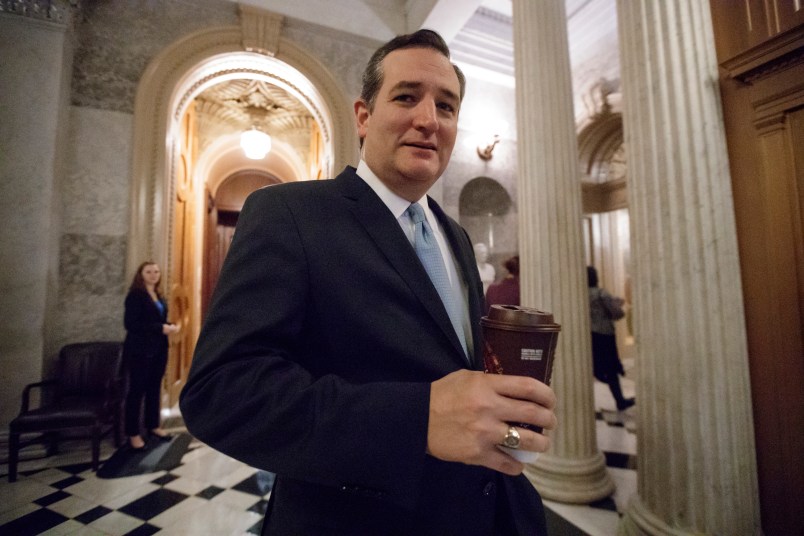The tweaked and re-tweaked Obamacare repeal bill is all-but-dead by Senate leaders’ own admission, but Sen. Ted Cruz (R-TX) hopes a new analysis of his amendment to that bill could help return it to the land of the living.
As the nonpartisan Congressional Budget Office continues to wrestle with scoring Cruz’s proposal, which would allow insurers to sell cheap, bare-bones plans that do not comply with Obamacare’s regulations, a draft report put together by the Department of Health and Human Services that became public Wednesday afternoon gave it a glowing review—asserting the policy would lower health insurance premiums and boost enrollment across the board.
The report, first obtained by the Washington Examiner, asserts that the Cruz amendment would increase coverage by more than two million people, and reduced insurance premiums by more than $7,000 per year. According to Politico, the consulting firm McKinsey was hired by HHS to crunch the numbers—the same firm that released a widely discredited report in 2011 claiming the Affordable Care Act would force millions of employers to stop offering health insurance to their workers.
Since its release Wednesday, McKinsey’s rosy analysis of the Cruz amendment has swiftly came under fire from health care experts who blast its methodology and assumptions.
Matthew Fiedler, a fellow at the Brookings Institute’s Center for Health Policy who worked for the Obama administration, explained to TPM that the report does not even score what the Senate was debating and may still consider: the Senate’s Obamacare repeal bill with the Cruz amendment. Instead, he said, it compares the Affordable Care Act as it stands today to the Affordable Care Act with the Cruz amendment.
“It’s an analysis of the Cruz amendment in a world that no one is talking about,” he said. “That’s of first-order importance, because they’re assuming the ACA’s cost sharing reductions and more generous subsidies are still in place, which has a fairly significant impact on the results. They show premiums lowering because many more healthy people would stay in the ACA-compliant insurance pool, whereas under [the Senate bill] they would almost certainly jump into the non-compliant pool.”
Fielder noted another “odd assumption” in the HHS report .
“They assume that the ACA’s single risk pool environment would be retained,” he said, referring to the current system in which healthy people help subsidize sicker consumers by being pooled in the same risk group.
“That’s just not possible under the Cruz amendment. Insurers would have very strong incentives and opportunities to get around the single risk pool requirement,” Fielder said.
Fielder and many other health care experts emphasized the complete lack of transparency in the HHS report, including their sources of data and their methodology.
Craig Garthwaite, the director of the Health Enterprise Management Program at Northwestern University’s Kellogg School of Economics said that the methodology that is identifiable in the report raises serious questions of bias.
“When asking if this non-biased report or not, I’m seeing choices that were made that seem strange,” he said. He singled out in particular the report’s comparison of premiums under the ACA with premiums under the Cruz amendment.
“They’re comparing two different populations of people based on age,” he explained. “The average ACA enrollee is about 50 years old today, and they compare it to a 40-year-old under the Cruz amendment. Obviously, older people pay more. So decisions like that suggest they’re stacking the deck in favor of finding lower premiums for the Cruz amendment.”
The HHS report does not divulge its methodology for calculating how people would respond to the availability of cheaper, non-ACA compliant plans, saying the models are “proprietary.” But the footnote revealing the age disparity has made experts like Garthwaite skeptical.
“It makes me more worried about decisions that might be more hidden within the model,” he told TPM. “But the decisions they are making publicly in this analysis suggest they are trying to find a favorable story.”
John Graves, an assistant professor of Health Policy at the Vanderbilt University School of Medicine echoed this concern, telling TPM that keeping the methodology “opaque” allows the report’s authors to “put their thumb on the scale.”
“If you’re doing a model like this and you aren’t transparent, you can come up with whatever answer you want,” he said.
Even within the “favorable story” about the Cruz amendment, noted Garthwaite, people should still pay attention to the fact that the ostensibly cheaper plans it would allow would have deductibles as high as $12,000 a year.
“What makes the Cruz plan not compliant is the really high deductible,” he said. “So it’s not surprising that it has much lower premiums, because it doesn’t provide much financial protection. It puts you on the hook for a lot more money.”
On Thursday, after successive waves of criticism, HHS released a statement admitting that the report made several “simplifying assumptions.”
“It was performed by an HHS contractor on an accelerated timeline, and, given the narrow scope of the analysis, made a number of simplifying assumptions in the interest of time,” the agency wrote.
One major assumption, as Fiedler noted, was the unrealistic single risk pool.
“The model assumes one plan design, though a number of benefit designs and actuarial values would likely be offered by issuers under the amendment,” HHS wrote.







This excerpt about the Senate BCRA plan was kind of revealing:
It’s like trying to calulate and predict the physical conditions of this universe, for example, the weight bearing properties of a girder, based on different physical constants in an adjacent “bubble universe.”
“Camelot!”
“Camelot!”
“Camelot!”
“It’s only a model.”
“Sssh!”
Is this argle bargle or jiggery pokery? I do know that whatever Cruz puts his name on will not be up to snuff or scratch.
We, the taxpayers of the United States, paid for that analysis. It is not, and cannot be, “proprietary.” Sounds like it’s time for another FOIA request.